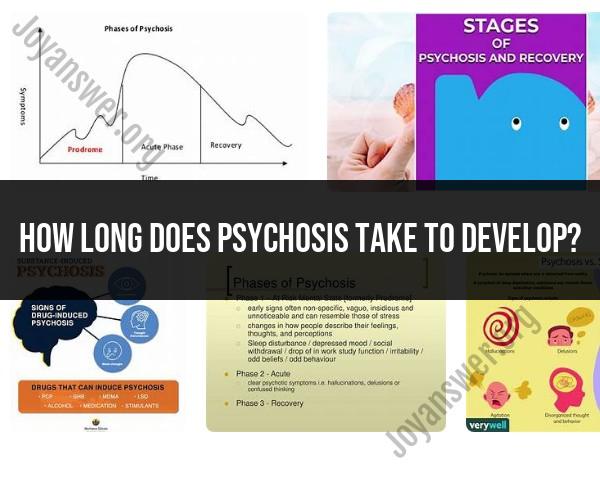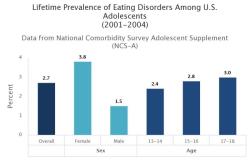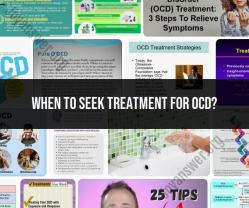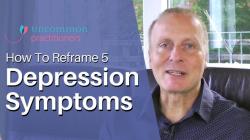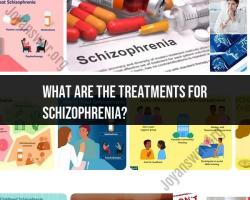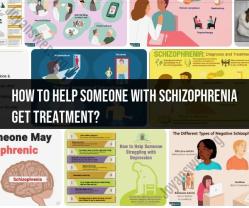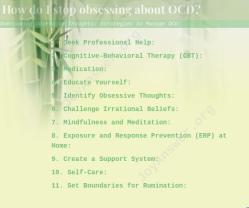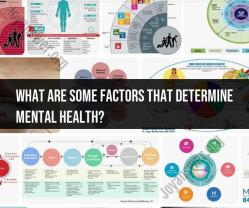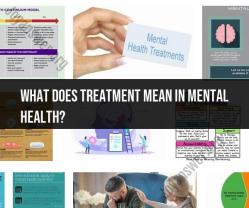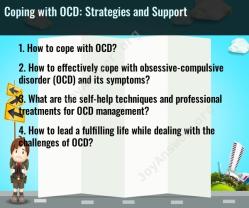How long does psychosis take to develop?
The development of psychosis can vary widely among individuals, and there isn't a fixed timeframe for its onset. Psychosis is not a specific disorder but rather a symptom that can occur in various mental health conditions, such as schizophrenia, bipolar disorder, or certain types of depression.
Several factors can influence the development of psychosis, and it's important to note that the timeline is often unpredictable. Some key factors and considerations include:
Underlying Mental Health Condition: Psychosis is often associated with specific mental health disorders. The time it takes for psychosis to develop may depend on the progression of the underlying condition, which varies from person to person.
Early Warning Signs: Individuals may experience early warning signs or prodromal symptoms before the full onset of psychosis. These signs can include changes in thoughts, feelings, and behavior. Recognizing and addressing these signs early may impact the overall course of the condition.
Stress and Trauma: High levels of stress or exposure to trauma can contribute to the development of psychosis. The timing and intensity of stressors can influence when psychosis emerges.
Genetic Factors: A family history of mental health disorders, including psychosis, may increase the risk. However, genetics alone do not determine the onset, and environmental factors play a significant role.
Substance Use: Substance abuse, particularly certain drugs, can trigger psychosis or exacerbate existing symptoms. The use of substances may accelerate the development of psychosis in susceptible individuals.
Neurobiological Factors: Changes in brain structure and function can contribute to the development of psychosis. Neurobiological factors may interact with genetic and environmental influences.
Age of Onset: The age at which an individual experiences the onset of psychosis can vary. Some mental health conditions associated with psychosis may emerge in adolescence or early adulthood.
It's crucial to seek professional help if someone is experiencing symptoms of psychosis or if there are concerns about their mental health. Early intervention and appropriate treatment can make a significant difference in managing and improving outcomes. If you or someone you know is in need of assistance, consider reaching out to a mental health professional or contacting a crisis hotline.
Understanding the Development of Psychosis:
1. Typical Timeline:
The development of psychosis isn't always linear and can vary significantly across individuals, but broadly, it can be understood through three phases:
a) Prodrome Phase (weeks/months/years): This phase might show subtle changes in behavior, thinking, and emotions like:
- Social withdrawal
- Sleep disturbances
- Changes in mood and motivation
- Difficulty concentrating
- Unusual experiences like perceptual glitches
b) Acute Phase (days/weeks/months): This phase marks the full expression of psychotic symptoms, including:
- Hallucinations (seeing, hearing, feeling things that aren't there)
- Delusions (fixed, false beliefs)
- Disorganized thinking and speech
- Bizarre behavior
c) Recovery Phase (variable): This phase involves managing and reducing symptoms with treatment. Recovery can be full, partial, or ongoing, with varying degrees of functionality regain.
2. Early Signs and Symptoms:
Not everyone experiencing prodromal symptoms develops psychosis. However, some potential early signs include:
- Increased anxiety and irritability
- Changes in appetite and sleep patterns
- Difficulty in forming or maintaining relationships
- Decline in academic performance or work activities
- Unusual sensory experiences (blurred vision, muffled sounds)
- Feelings of being watched or followed
3. Individual Variability:
The progression of psychosis is unique for each person. Some may experience a swift onset of acute symptoms, while others might have gradual progression from prodrome. The severity, duration, and response to treatment can also differ significantly.
4. Contributing Factors:
Several factors are linked to the risk of developing psychosis, including:
- Genetics: Family history of psychosis increases the risk.
- Brain development: Abnormalities in brain structure or function.
- Environmental factors: Trauma, early life stressors, substance abuse.
- Psychological factors: Depression, anxiety, social isolation.
5. Early Intervention:
While preventing psychosis remains challenging, early intervention can significantly improve outcomes. Prompt recognition and treatment during the prodrome or acute phase can:
- Reduce the severity and duration of symptoms.
- Improve long-term functioning and quality of life.
- Increase the chances of full recovery.
If you or someone you know experiences any potential signs of psychosis, seeking professional help immediately is crucial. Early intervention can make a significant difference in managing the condition and promoting recovery.
Remember, this information is for general understanding and shouldn't substitute for professional medical advice. Always consult a qualified mental health professional for diagnosis and treatment of any mental health concerns.
